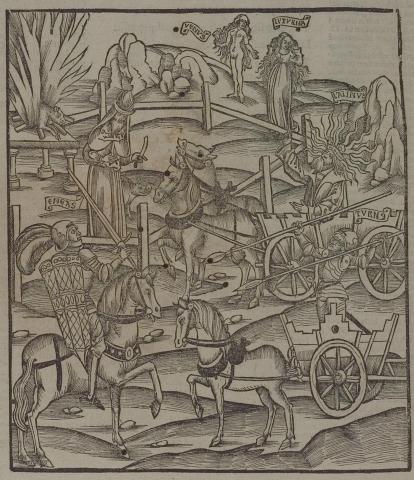CORE VOCABULARY
intereā: (adv.), amid these things; meanwhile, in the meantime, 1.418, et al.
mōlēs, is, f.: a cumbrous mass; a heavy pile or fabric; mound, rampart, 9.35; dike, 2.497; a mass of buildings, vast buildings, 1.421; structure, 11.130; frame or figure, 2.32; bulk, 5.118; weight, 7.589; pile, mass, 1.61; gigantic frame, 5.431; warlike engine, siege tower, 5.439; array, pomp, train, 12.161; body of soldiers, phalanx, 12.575; heavy storm, tempest, 5.790; toil, work, labor, 1.33.
Latīnus, ī, m.: Latinus, a king of Latium, whose capital was Laurentum, and whose daughter, Lavinia, became the wife of Aeneas, 6.891, et al. (Latium)
quadriiugus, a, um: adj. (quadrīgae), pertaining to a team of four; four-horse-, 12.162.
tempus, oris, n.: 1. Time in general, a period, time, 1.278; interval or space of time, 4.433; crisis, circumstance, juncture, 7.37; season, fitting time, opportunity, proper moment, 4.294; ex longō (tempore), in or for a long time, 9.64. 2. The temple of the forehead, 9.418; commonly pl., 2.684; of animals, 12.173.
circum: (adv.), about, around; (prep. with acc.), around, about.
aurātus, a, um: adj. (aurum), gilded, golden, of gold, 12.163; embroidered with gold, 5.250.
bis: (adv.), twice, 1.381. (in composition bi-)
sex: six, 9.272, et al. (num. indecl. adj.)
radius, iī, m.: a staff, rod; spoke of a wheel, 6.616; beam, ray, 5.65; a shuttle, 9.476; the representation of rays on a crown, 12.163.
fulgēns, entis: gleaming, flashing, 2.749; glowing, bright, 9.614. (fulgeō)
sōl, sōlis, m.: the sun, 1.431, et al.; a day, 3.203; sunlight, 2.475; as a god, Sōl, 1.568, et al.; pl., sōlēs, days, 3.203.
avus, ī, m.: a grandfather, grandsire, 2.457; sire, father, ancestor, 6.840.
specimen, inis, n.: a means of seeing or knowing; token, symbol, emblem, 12.164. (speciō, look)
bīgae, ārum, f. pl: a team of two horses; a car or chariot drawn by two horses; a car, 2.272; bīgīs in albīs, in a chariot drawn by two white horses, 12.164. . (bis and iugum)
Turnus, ī, m.: the chief of the Rutulians, 7.56, et al.
bīnī, ae, a: (adj. num. distrib.), two by two; two to each, 5.61; (poet. as cardinal), two, 1.313, et al. (bis)
manus, ūs, f.: the hand, 1.487; freq.; (meton.), action, movement of the hand; work, art, handiwork, 3.486; prowess, heroic deed, action, 2.434; force, violence, 2.645; a collection of persons; a band, crew, troop; an army, 2.29; forces, 5.623; multitude, 6.660; pl., manūs, workmen, 11.329; dare manūs, to yield, 11.558; extrēma manus, the finishing hand or touch, 7.572.
crīspō, no perf., ātus, 1, a.: to crisp, curl; to vibrate, brandish, 1.313.
hastīle, is, n.: the shaft of a spear; a spear, lance, javelin, 1.313, et al.; a spear-like sapling or branch; a shoot, 3.23. (hasta)
Aenēās, ae, m.: 1. A Trojan chief, son of Venus and Anchises, and hero of the Aeneid, 1.92. 2. Aenēās Silvius, one of the Alban kings, 6.769.
Rōmānus, a, um: adj. (Rōma), belonging to Rome; Roman, 1.33; subst., Rōmānus, ī, m., a Roman, 1.234.
stirps, stirpis, f.: the lower part of the trunk together with the roots of plants and trees; the extremity, end; root; trunk, tree, 12.770; (fig.), origin, descent, lineage, stock, race, 1.626, et al.
orīgō, inis, f.: a source, origin, beginning, 1.372; descent, lineage, birth, 1.286; source, root, founder, 12.166. (orior)
sīdereus, a, um: adj. (sīdus), abounding in stars, starry, 10.3; star-lighted, 3.586; glittering, flashing, 12.167.
flāgrō, āvī, ātus, 1, n.: to be on fire or in flames; burn, blaze, 2.685; glow, 1.710; flash, 12.167; blush, 12.65; rage, 11.225.
clipeus, ī, m., and clipeum, ī, n.: a round shield; a shield, 2.227, et al.
iūxtā: (adv. and prep. w. acc.), near, close, near by, 2.513; at the same time, 2.666; near to, 3.506.
Ascanius, iī, m.: Ascanius, son of Aeneas, and traditional founder of Alba Longa, 1.267.
Rōma, ae, f.: Rome, 1.7, et al.
prōcēdō, cessī, cessus, 3, n.: to go or come forth or forward; advance, proceed, go on, 2.760; move, 4.587; elapse, pass by, 3.356; continue, 5.461.
pūrus, a, um: (adj.), free from stain, pure, 7.489; clear, serene, 2.590; open, unobstructed, 12.771; unmixed, 6.746; pointless, 6.760; unmarked, without symbol, or device, 11.711.
saetiger, era, erum: adj. (saeta and gerō), bristle-bearing, bristly, 7.17.
fētus, ūs, m.: a bearing or breeding; the young; the new swarm, 1.432; litter, 3.391; of vegetable products, growth, sprig, shoot, 6.207; fruit; product.
sūs, suis, c.: a hog, swine, 1.635; sow, 3.390.
intōnsus, a, um: (adj.), unshaven, unshorn, 9.181; leafy, 9.681.
bidēns, entis: adj. (bis and dēns), having two teeth or two complete rows of teeth; subst., f. (sc. victima), an animal suitable for the altar; a sheep with two conspicuous teeth supplanting two of the milk-teeth; a sheep, 4.57.
admoveō, mōvī, mōtus, 2, a.: to move, bring near to; to carry, convey to, 3.410; apply to, touch; admovēre ūbera, give suck, 4.367.
frūx, frūgis, f.: (found usually in the pl., frūgēs, um) fruit, of the ground and of trees; fruit of the ground; corn, 1.178; wheaten meal, sacrificial grits, cake, 2.133; herbs, 6.420. (fruor)
salsus, a, um: adj. (cf. sal), made salty; salted, 2.133; salt-, briny, 2.173.
notō, āvī, ātus, 1, a.: to mark; to observe, note, mark, 3.515. (nota)
pecus, udis, f.: one animal of a flock or herd; an animal, 1.743; a sheep, 3.120; victim for sacrifices, 4.63.
patera, ae, f.: a broad, saucer-shaped dish, used in making libations; a libation cup, patera, 1.729. (pateō)
altāria, ium, n.: the upper part of an altar; a high altar, 7.211; an altar, 2.515. (altus)
lībō, āvī, ātus, 1, a.: to taste, sip; to touch lightly; kiss, 1.256; pour out as a drink offering, 1.736; make a libation, 3.354; (w. acc. of the object on which the libation is poured), to pour libations on, 12.174.

